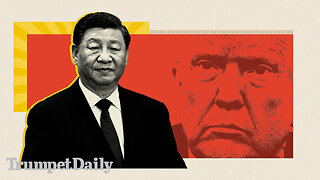Premium Only Content

Prepare for the Digital Dollar
Move over Bitcoin The Federal Reserve is taking what may be the first significant step toward launching its own virtual currency, a move that could shake up banks, give millions of low-income Americans access to the financial system and fortify the dollar’s status as the world’s reserve currency. The idea of creating a fully digital version of the U.S. dollar, which was unthinkable just a few years ago, has gained bipartisan interest from lawmakers as diverse as Sens. Elizabeth Warren (D-Mass.) and John Kennedy (R-La.) The explosive rise of private crypto currencies in recent years motivated the Fed to start considering a digital dollar to be used alongside the traditional paper currency. Although crypto currencies like bitcoin are digital, a Central Bank Digital Currency would be fundamentally different from current cryptos because it would still be controlled by a central bank rather than a decentralized computer network.
Coinbase, maybe you’ve never heard of it. Or, maybe you’re confused about what it even is. A quick explanation: Coinbase is an app that lets you buy and sell all sorts of cryptocurrencies. You can also use Coinbase to convert one cryptocurrency to another, or to send and receive cryptocurrency to and from other people. Coinbase also shows you the current price and trends for cryptocurrencies, a look at your portfolio of holdings, and news stories about the industry. China’s central bank is rolling out its own digital yuan as it cracks down on the mining and usage of crytocurrencies within its border.
Barb Horwitz speaks on Civil Disobedience. Remember the sit-ins at segregated lunch counters in the South in the early 60s? Remember the flag burnings to protest the Vietnam War? And more recently, think about Edward Snowden’s release of highly classified NSA documents to bring public awareness of the government’s unconstitutional surveillance practices and infringement of civil liberties. These are examples of civil disobedience, which is the active, non-violent refusal to accept the dictates of governments. It’s a grass roots form of action when traditional methods of protest such as petitioning, lobbying, marching, and voting have failed to get a response from the government. It came to public attention in the mid-1800s through the work of the famous American philosopher, Henry David Thoreau, and achieved its greatest recognition when Martin Luther King used practical methods to implement it during the fight for civil rights in the 1960s. We’ll take a look at Thoreau’s and King’s thoughts about it tonight, and see what insights they can give us today to meaningfully react to and protest current governmental policies.
Recorded on October 7th, 2021
-
 1:08:44
1:08:44
EmpowerUAmerica
14 days agoLED Lighting and Human Health
1.02K1 -
 1:19:00
1:19:00
Sarah Westall
1 hour agoMassive Spiral Structures Found Under Giza Pyramids, Advanced Ancient Societies w/ Jay Anderson
19K7 -
 54:32
54:32
LFA TV
9 hours agoStrongman Stare Down | TRUMPET DAILY 4.9.25 7PM
26.6K2 -
 1:35:31
1:35:31
Redacted News
5 hours agoBioweapons over America? U.S. Geo-engineering caught raining mysterious objects over U.S. | Redacted
166K216 -
 1:19:20
1:19:20
vivafrei
7 hours agoCanadian Government & Courts Denying Military Jab Injury Compensation? Trump Pronouns "No Thanks"?
105K34 -
 54:20
54:20
Candace Show Podcast
5 hours agoHarvey Weinstein Calls Out Justin Baldoni | #MAHA Gaslighting Begins | Candace Ep 174
104K67 -
 22:26
22:26
Exploring With Nug
8 hours ago $0.95 earnedI Found a Heavy Bag Underwater Scuba Diving! What's Inside?
20.5K1 -
 LIVE
LIVE
Dr Disrespect
9 hours ago🔴LIVE - DR DISRESPECT - WARZONE VERDANSK - THE NUKE
1,651 watching -
 2:52:47
2:52:47
Canada Strong and Free Network
3 hours agoCanada Strong and Free Network
32.7K3 -
 11:12:17
11:12:17
LFA TV
1 day agoLFA TV - ALL DAY LIVE STREAM 4/9/25
141K15